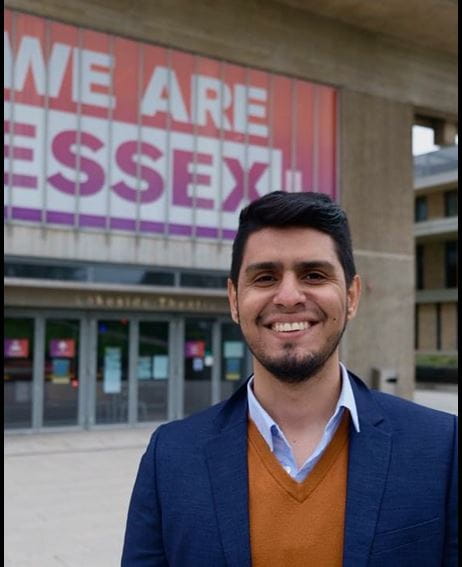Defending Academic Freedom in Latin America: Reflections from Ricardo Villalobos at the 2025 Human Rights Centre Clinic Annual Conference

This year’s Annual Human Rights Centre Clinic Conference “On the Frontlines of Global Justice” brought together students, alumni, and global partners who’ve worked on urgent issues as part of Human Rights Centre Clinic projects. Alumni who have gone on to successful careers in the human rights field reflected on their time in the Clinic, and how their experience of studying at Essex prepared them for their careers. One of those speakers was Ricardo Villalobos – a Venezuelan lawyer, scholar, and alumnus of the University of Essex (LLM International Human Rights Law, 2020-21). Ricardo delivered a powerful account of his human rights work in Latin America, focusing particularly on the defence of academic freedom. Currently a board member and the Coordinator of the Research and International Advocacy Department at Aula Abierta, an NGO working on issues of academic freedom across Latin America, Ricardo detailed his journey from grassroots documentation efforts in Venezuela to high-level advocacy before international human rights bodies.
Ricardo began his human rights career in 2016, focusing on violations against students, lecturers, and researchers. While his initial work centred on Venezuela, it soon became clear that these patterns were not isolated. Similar threats to academic freedom were emerging in countries such as Nicaragua, Colombia, Bolivia, Costa Rica, and Argentina, among others. This regional pattern led his organisation to expand its monitoring and advocacy efforts throughout the Americas.
He described three pillars of his work over the past nine years: human rights research, international advocacy, and strategic litigation. One landmark achievement was his co-coordination of the first public hearing on academic freedom in the history of the Inter-American Commission on Human Rights in 2019 – an event that marked a turning point in recognising academic freedom as a legitimate human rights concern. Building on this milestone, he also took part in the second public hearing on academic freedom in the Americas, held in November 2024, further reinforcing the issue’s relevance within the regional human rights framework.
Ricardo also played a key role in the drafting of the 2021 Inter-American Principles on Academic Freedom and University Autonomy. He noted the significance of this document as the first of its kind to formally recognise academic freedom as a standalone human right within the international human rights system. His LLM dissertation at Essex, supervised by Professor Ahmed Shaheed, provided a legal argument for recognising academic freedom as a human right, directly informing civil society submissions and the development of the Inter-American Principles.
In a particularly moving section of his talk, Ricardo explained how the University of Essex impacted his work even before he enrolled as a student. During the 2017 protests in Venezuela, while facing an overwhelming volume of cases and little technical guidance, he discovered the University’s Torture Reporting Handbook. This resource became the foundation for his documentation methods and helped produce reports later cited by bodies such as the OAS Panel of Independent International Experts on the Possible Commission of Crimes Against Humanity in Venezuela and the UN Fact-Finding Mission on Venezuela.
Once at Essex, Ricardo deepened his engagement through the Human Rights Centre Clinic. He praised the Clinic’s holistic approach, noting how it trained students not just in law but in the deeper structural and ethical questions that shape real-world human rights work: “In all my advocacy activities, I always remember the conversations we used to have in the Clinic on the importance of being aware about the potential pitfalls of certain strategies, the role of victims, and of wisely assessing all these elements”.
As universities and scholars around the world come under increasing pressure, Ricardo’s work is a powerful reminder of why academic freedom matters – and how one person, backed by the right tools and values, can help drive real change. Ricardo’s story is a brilliant example of how Essex helps shape human rights defenders – not just through teaching, but by giving them the support, resources, and space to grow as practitioners. We’re proud that the Clinic has played a part in his journey.
Dr Sabina Garahan, Director of the Essex Human Rights Centre Clinic, commented: “it was inspiring to hear about Ricardo’s path, experience at Essex, and unwavering commitment to human rights. The Clinic is proud of its alumni and everything they continue to do to defend rights and challenge injustice across the globe”.

Ricardo, pictured during his time at Essex.
